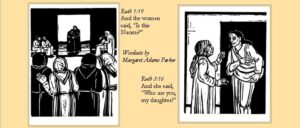 Ruach HaYam teaching presented by Penina Weinberg
Ruach HaYam teaching presented by Penina Weinberg
May 20, 2021
The book of Ruth poses hard questions about the relationship between humanity and God, and between one human and another. Like Job, Naomi agonizes over being abandoned by God, even afflicted by God. The community of Naomi’s birth rejects her upon her return. Yet Ruth is able to transform the village and effect Naomi’s restoration to respected elder. What does it mean that God can afflict human beings? Ruth and Naomi sit outside the gates at the beginning. What is the role of women in transforming society? What is the role of marginalized people generally in the repair of the world? What can we apply from Liam Hooper’s teaching in April?
Tikva Frymer Kensky writes: it is up to humanity to ensure that the foundations of the earth do not totter. The way to do this is right behavior and social justice. This is an enormous task, but the way to accomplish it has been revealed: God has instructed and continues to instruct the people as to how they are to behave. “In the Wake of the Goddesses”, pg 106
We will read the book of Ruth with the teachings of Liam and Frymer-Kensky in mind – looking for fresh insights on the meaning of chesed and how to perform it.
Banner shows two woodcuts by Margaret Adams Parker. In both, Naomi and Ruth and villagers are portrayed as long robed and hard laboring – not the common idyllic scenes. First image shows Naomi entering her old village, drooping, supported by Ruth. Caption “Ruth 1:19 – And the women said, ‘Is this Naomi?’” Second image shows Naomi looking up at Ruth. Caption “Ruth 3:16 – And she said, ‘Who are you my daughter?’”
At 6:45pm ET, meeting will be open for logging in, schmoozing and solving any technical issues. [see below for details]
Study begins at 7:15 ET.
——>>>>>> Zoom login can be found in the Ruach HaYam study room
https://www.studywithpenina.com/ruach_hayam
——>>>>>> Only recognized names will be admitted to Zoom meeting. Please be sure to RSVP
Penina Weinberg is an independent Hebrew bible scholar whose study and teaching focus on the intersection of power, politics and gender in the Hebrew Bible. She has run workshops for Nehirim and Keshet and has been teaching Hebrew bible for 10 years. She has written in Tikkun and HBI blog, and is the leader and founder of Ruach HaYam.
*** Ruach HaYam https://www.facebook.com/groups/Ruach.HaYam/ study sessions provide a queer Jewish look at text, and are welcoming to LGBTQ+ and allies, to any learning or faith background, to all bodies, and friendly to beginners***
 Ruach HaYam teaching presented by Penina Weinberg
Ruach HaYam teaching presented by Penina Weinberg
